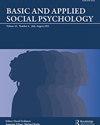Affirmation and Majority Students: Does Affirmation Impair Academic Performance in White Males?
IF 1.8
3区 心理学
Q2 PSYCHOLOGY, SOCIAL
引用次数: 1
Abstract
Abstract Self-affirmation is a promising brief intervention for reducing the academic achievement gap between majority and stigmatized groups (e.g., underrepresented minorities, women in STEM fields). Affirmations are thought to improve academic performance among stigmatized groups by expanding one’s sense of self, buffering social belonging, and reducing social identity threat. Despite encouraging results, some studies suggest that affirmations may inadvertently decrease the academic performance of nonthreatened White students. We conducted experimental studies to evaluate whether an affirmation focused on the theme of social belonging (i.e., belonging-affirmation) decreased the math performance of White males. We hypothesized that the belonging-affirmation would enhance performance for female participants but diminish math performance for White male participants. Two studies were conducted to evaluate these hypotheses: (1) a lab-based study involving 122 White male and mixed-ethnicity female undergraduates, and (2) an online study involving 197 young adult White males and females. Results failed to support study hypotheses, with no substantive differences in math performance found between male and female participants randomized to a belonging-affirmation versus neutral writing control. These findings are consistent with recent large-scale field replication failures of self-affirmation interventions, indicating that the phenomena may be more nuanced and fragile than suggested by early research findings.肯定和多数学生:肯定会影响白人男性的学习成绩吗?
自我肯定是一种有希望的短期干预措施,可以减少多数群体和被污名化群体(例如,代表性不足的少数民族,STEM领域的女性)之间的学术成就差距。肯定被认为可以通过扩大自我意识、缓冲社会归属感和减少社会身份威胁来提高被污名化群体的学习成绩。尽管结果令人鼓舞,但一些研究表明,肯定可能会无意中降低没有受到威胁的白人学生的学习成绩。我们进行了实验研究来评估以社会归属为主题的肯定(即归属肯定)是否会降低白人男性的数学成绩。我们假设归属肯定会提高女性参与者的成绩,但会降低白人男性参与者的数学成绩。为了验证这些假设,我们进行了两项研究:(1)一项基于实验室的研究,涉及122名白人男性和混血女性本科生;(2)一项涉及197名年轻成年白人男性和女性的在线研究。结果未能支持研究假设,随机分配到归属肯定组和中性写作组的男性和女性参与者在数学成绩上没有实质性差异。这些发现与最近自我肯定干预的大规模现场复制失败相一致,表明这种现象可能比早期研究结果所表明的更为微妙和脆弱。
本文章由计算机程序翻译,如有差异,请以英文原文为准。
求助全文
约1分钟内获得全文
求助全文
来源期刊

Basic and Applied Social Psychology
PSYCHOLOGY, SOCIAL-
CiteScore
4.50
自引率
12.50%
发文量
7
期刊介绍:
Basic and Applied Social Psychology (BASP) emphasizes the publication of outstanding research articles, but also considers literature reviews, criticism, and methodological or theoretical statements spanning the entire range of social psychological issues. The journal will publish basic work in areas of social psychology that can be applied to societal problems, as well as direct application of social psychology to such problems. The journal provides a venue for a broad range of specialty areas, including research on legal and political issues, environmental influences on behavior, organizations, aging, medical and health-related outcomes, sexuality, education and learning, the effects of mass media, gender issues, and population problems.
 求助内容:
求助内容: 应助结果提醒方式:
应助结果提醒方式:


